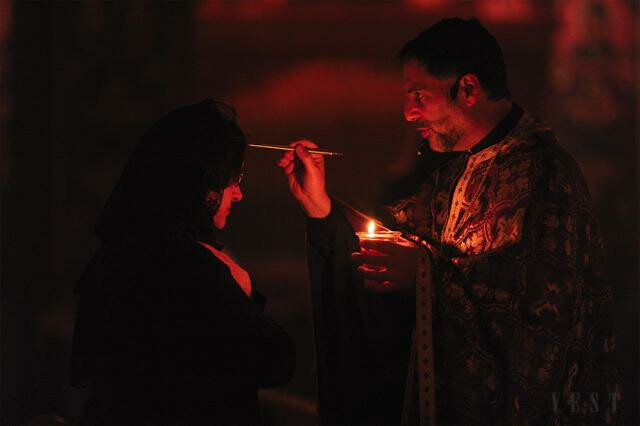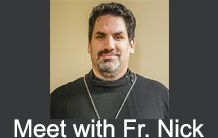Holy Unction
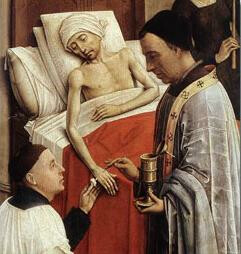 |
|
This Sacrament is described in Holy Scripture by St. James the Brother of the Lord: Is any among you sick? Let him, call for the elders of the Church, and let them pray over him, anointing him with oil in the name of the Lord; and the prayer of faith will save the sick man, and the Lord will raise him up; and if he has committed sins, he will be forgiven (James 5:14-15). From the above text, we can see that this Sacrament has a twofold purpose bodily healing and the forgiveness of sins. The two are joined, for man is a unity of body and soul and there can be no sharp distinction between bodily and spiritual sicknesses. Of course, the Church does not believe that this anointing is automatically followed by recovery of health, for God's will and not man's prevails in all instances. Sometimes the sick person is healed and recovers after receiving the Sacrament, but in other cases he does not recover, but the Sacrament, nonetheless, gives him the spiritual strength to prepare for death.
We must note that this Sacrament is not only for those on their deathbed, but for anyone who is sick. It may also be performed over the healthy as well (as is the custom on Holy Wednesday in many places) and in Greece it is often performed over the healthy before Holy Communion, since the rite also contains elements of repentance, although it should be noted that this does not replace the Sacrament of Confession.
|
Excerpt taken from "These Truths We Hold - The Holy Orthodox Church: Her Life and Teachings". Compiled and Edited by A Monk of St. Tikhon's Monastery. Copyright 1986 by the St. Tikhon's Seminary Press, South Canaan, Pennsylvania 18459. |

 The Sacrament is formally performed by seven Priests, reflecting an ancient practice of performing in the course of seven days, each day having its own prayers, although, if due to necessity, it can be performed by three or even one Priest. At each of the anointings the following prayer is repeated: Holy Father, Physician of souls and bodies, Who sent Thine Only-begotten Son, our Lord Jesus Christ Who healed every illness and delivered from death, heal Thy servant from the weakness that holds his/her body, of either body or soul, and enliven him/her by the grace of Thy Christ, by the prayers of the All-holy Lady Theotokos and all the Saints.
The Sacrament is formally performed by seven Priests, reflecting an ancient practice of performing in the course of seven days, each day having its own prayers, although, if due to necessity, it can be performed by three or even one Priest. At each of the anointings the following prayer is repeated: Holy Father, Physician of souls and bodies, Who sent Thine Only-begotten Son, our Lord Jesus Christ Who healed every illness and delivered from death, heal Thy servant from the weakness that holds his/her body, of either body or soul, and enliven him/her by the grace of Thy Christ, by the prayers of the All-holy Lady Theotokos and all the Saints.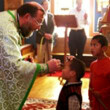 Seven Epistle and Gospel readings are said and seven anointings are performed. After the seventh, the open Gospel Book is placed over the head of the one receiving the Sacrament, during which the senior Priest reads the Absolution Prayer containing the following: I do not lay my sinful hands on the head of him who comes...but Thy mighty and powerful hand, which is in the Holy Gospel. This replaces an ancient practice of laying-on of hands.
Seven Epistle and Gospel readings are said and seven anointings are performed. After the seventh, the open Gospel Book is placed over the head of the one receiving the Sacrament, during which the senior Priest reads the Absolution Prayer containing the following: I do not lay my sinful hands on the head of him who comes...but Thy mighty and powerful hand, which is in the Holy Gospel. This replaces an ancient practice of laying-on of hands.